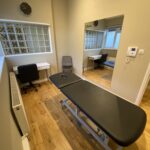What is a Sports Injury?
The term sports injuries in its most basic sense refers to any injury which occurs during sport or exercise. The most common causes of sports injuries are a fall or heavy blow, poor training practices or inappropriate training gear and equipment. Some sports injuries can be due to inadequate warming up or stretching before and after exercise or over-exercising beyond your current fitness level.
Some of the Most Common Types of Sports Injuries
- Sprains and strains
- Knee injuries
- Swollen or bruised muscles
- Achilles tendon injuries
- Pain along the shin bone (commonly called shin splints)
- Fractures
- Dislocations
Classification of Sports Injuries
Sports injuries can be classified as either traumatic or overuse injuries and divided into acute or chronic. (which refers to the amount of time you have had the injury for.)
Acute sports injuries
Occur suddenly when playing sports or exercising. Examples of acute sports injuries are sprained ankles, strained muscles and bone fractures. Possible signs of an acute injury are:
- Sudden severe pain
- Swelling
- Not being able to place weight on a leg, knee, ankle or foot
- An arm, elbow, wrist, hand or finger that is suddenly very tender
- Not being able to move a joint as normal
- Extreme leg or arm weakness
- A bone or joint that it is visibly out of place
Chronic sports injuries
These are on-going injuries which may prevent you from playing sports or exercising. The pain can be brought on whilst exercising or build gradually after exercising. Chronic injuries are often niggling intermittent problems which you can put up with but can also stop you from taking part in your chosen activity. Signs of a chronic injury include:
- By definition, chronic injuries have been troubling you for a month or more
- The pain can be constant or intermittent and can prevent you from exercising
- You may experience a dull ache at rest
- Swelling can be intermittent (especially after exercising)
How can Osteopathy Help?
Our therapists will take a thorough case history and perform a series of physical tests in order to reach an accurate diagnosis for your specific complaint.
Frequently, with chronic and reoccurring sports injuries, we find that another part of the body requires attention to prevent the injury from returning. Faulty equipment, such as poor trainers when running or the wrong grip width on a tennis racket, can contribute to injuries.
Following your assessment you will be given advice on how to maximise your recovery and how to prevent further injury.
Our Approach
- Osteopathic treatment to help return your body to a point of balance which will help speed up your recovery
- Tips on how to adjust your training to suit your particular body type
- Strengthening exercises
- Advice on warm up/warm down routines
- Your osteopath may advise you on whether further tests such as x-rays, MRI scans or blood tests are necessary
How to Prevent Sports Injuries
- Always warm up thoroughly before sport or exercise
- Don’t over do it; know your body’s limits
- Cool down and stretch thoroughly after sports or workouts
- Wear shoes that fit properly, are stable and absorb shock well
- Don’t try to do a week’s worth of exercise in a day or two
- Learn to do your sport properly. Use appropriate gear and equipment
- Build up your exercise level gradually
- Strive for a balanced total body workout of cardiovascular, strength training and flexibility exercises
What to do if i get injured?
Stop the activity immediately, never try and play through the pain as this may cause further damage and possibly prolong your recovery. Often the extent of the injury may not be instantly apparent at the time, but it is advisable to call a health professional if…
- The injury causes severe pain swelling or numbness
- You can’t put weight on the area
- A joint feels abnormal, loose or unstable
- If the symptoms feel like they are worsening
- Unusual shape or a deformity
- Signs of shock such as pale or clammy skin


